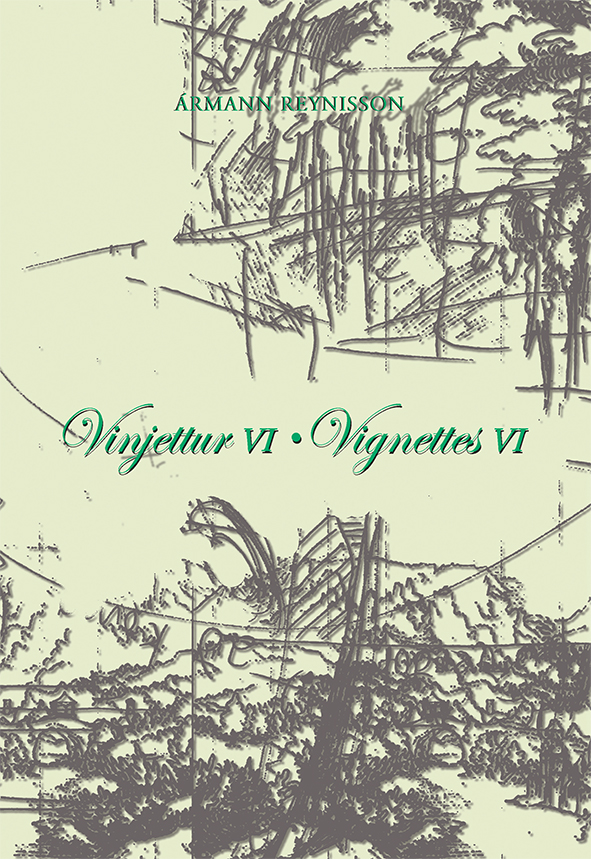Vignettes XV
Reykjavík has so much to offer with its natural wonders, fascinating places and not least, its diverse people with all their daily struggles like the amusing quarrels that occur between neighbours – often with unexpected conclusions. As well as stories on these subjects, you will also find some portrait vignettes in the collection of some of the larger and more creative personalities that characterise the city, people who Ármann Reynisson has encountered along life’s journey. The author then takes a trip down memory lane with a few astonishing stories from the past and the book ends with stories from Búðir on the westernmost tip of the Snæfellsnes pensinsular. Each story benefits from the unique style of the author who is concise but poetic, realistic and illuminating.
Chapters
The gold digger
The hard-working man becomes a gold digger in the distant land and accumulates enough in order to live comfortably. He travels far and wide and is always looking for places where gold can be found in search of great wealth. The naturalised American writes to his mother and friends every now and then.
Kogga
The potter has the courage to take on life and all its tribulations and she matures and it strengthens her desire to succeed. She makes her own dreams come true, she fully utilises her imagination in her creativity and she is not afraid to stand by the ideas she works with and boldly carries out. The result of this work has culminated in a world class gallery on Vesturgata 5 in Reykjavík, with designs from almost one hundred collections on offer, as well as specially commissioned pieces. Kogga personally handles all of the treasures that leave her shop and
tastefully designs the boxes and packaging that these objects are packed into. The artist’s work arouses admiration far and wide whether it be for their oval form and structure, patterns or colours – and a variety of methods for firing are masterfully displayed in the textures.
The rescue mission
Dusk looms as the two men throw themselves overboard. Captain Hákon swims a short distance away from the boat, dragging captain Einar behind him west up to the rocks along Þjórsárós. Exhausted, the captain quite inexplicably manages to drag his companion and himself up onto a slippery hollow covered with kelp and other marine vegetation. The pursuit for survival is so strong that no other thought enters into his mind other than to survive and captain Hákon
detects a vague presence helping them. The companions hold each other tightly, hugging vigorously in order to keep warm. They have begun to shake and stutter their words when the Coast Guard helicopter arrives to rescue them an hour into their hazardous journey.
The heap of junk
A short time later, the phone rings and a male neighbour’s voice can be heard, the voice of a well-known director. It is obvious that he has a lot on his mind. The honourable man, who had accepted the hospitality of his neighbours, directs a torrent of abuse at the couple using foul language and ends the call by saying: “and you can eat those precious flowers of yours!” and hangs up. A shadow falls over the contentment of the couple and communications between the two sets of neighbours is never the same whilst both parties are still living in the renowned
street. The director monitors every move that his neighbours make – and is even noticed photographing the couple from the upper floor of his house.
The crystal night
Then, one beautiful Spring evening, as the birds are singing, the writer takes his place in the red master chair, mentally exhausted due to tension and insomnia. He pours himself a glass of Sherry and listens to the Four Seasons by Vivaldi. After a short time, the man rises to his feet, raises the volume of the music dramatically and dresses up in a tuxedo with all the accessories, not forgetting a hand-knotted silk bow tie. He then pops the cork on a cold bottle of Champagne, pours it into an exclusive champagne glass from Bohemia and sips it slowly. Then, the well-dressed man goes to his storage room and gathers all the bottles and jars he can find. As the writer drinks his wine and toasts the city, he systematically begins throwing the glasses and jars out of his living room window, resulting in the most phenomenal sounds of shattering glass, which echoes through the street as if an apocalypse of sorts was fast approaching. A shiver runs down the author’s spine, his heart races and he suddenly releases the tension that had accumulated after half a year of noise pollution. With this ceremony, the author manages indirectly to regain control of the situation.
Búðir
The dream is realised and the house of God is moved to the top of the hill and is brought back to its original state. The surrounding area is covered with a beautiful garden made from volcanic rock. The rural church is re-inaugurated in late summer in lovely weather in the seventh year of the ninth decade of the twentieth century. Interest in Búðir multiplies in the new century and people fly in from far and wide to enjoy the surrounding nature – to revitalise themselves using the energy that the environment provides. The place becomes a centre for international weddings.



